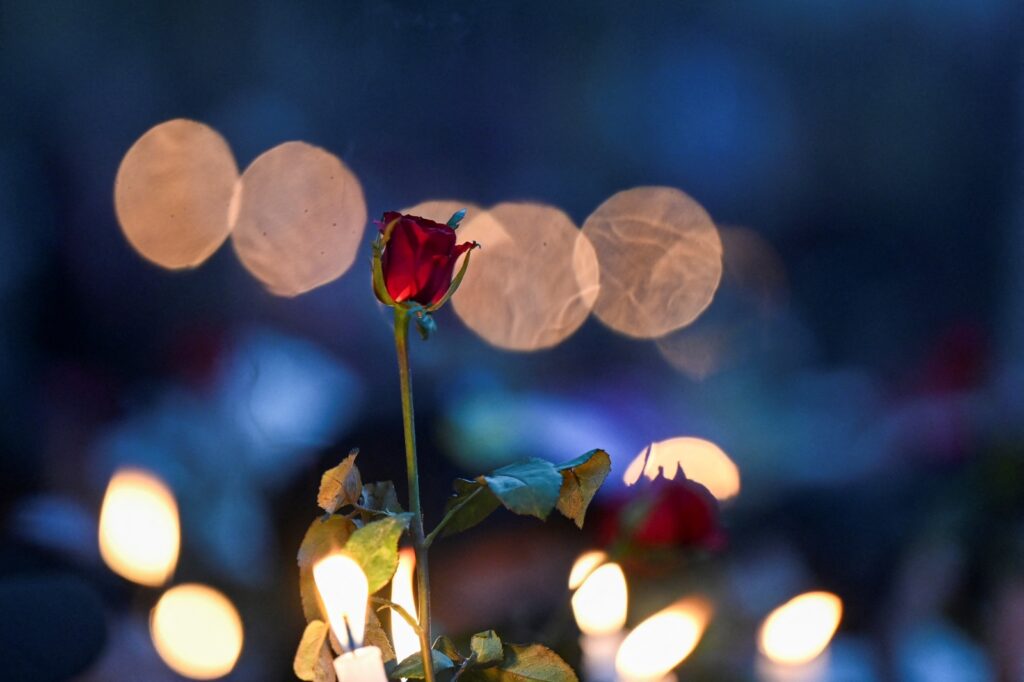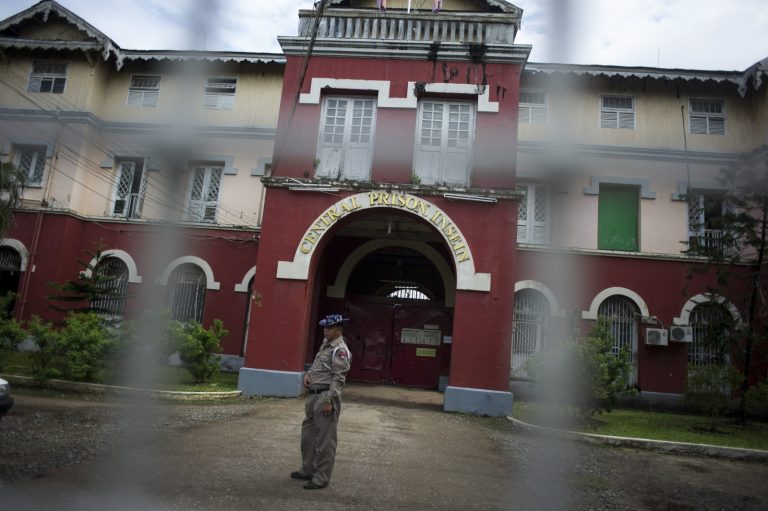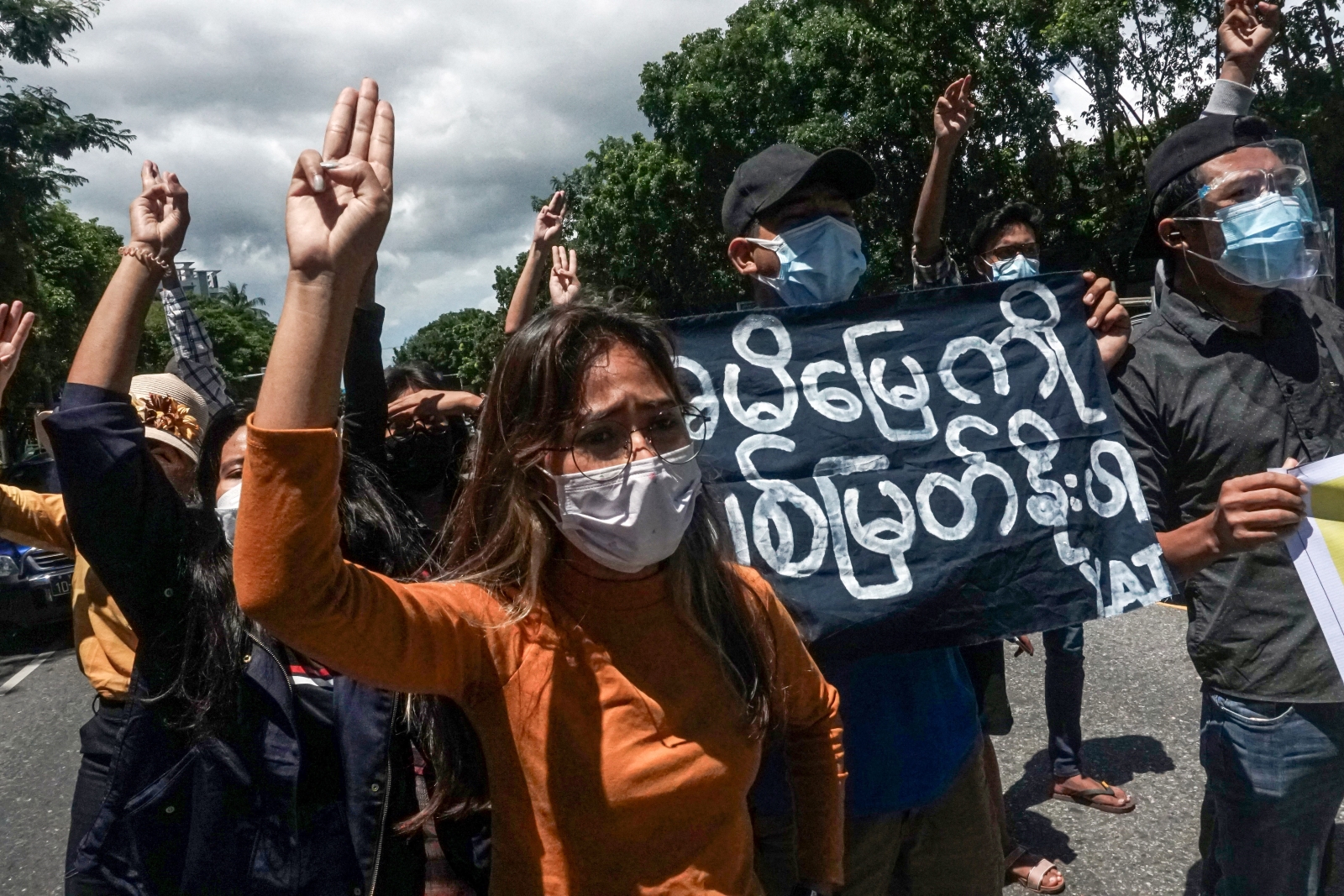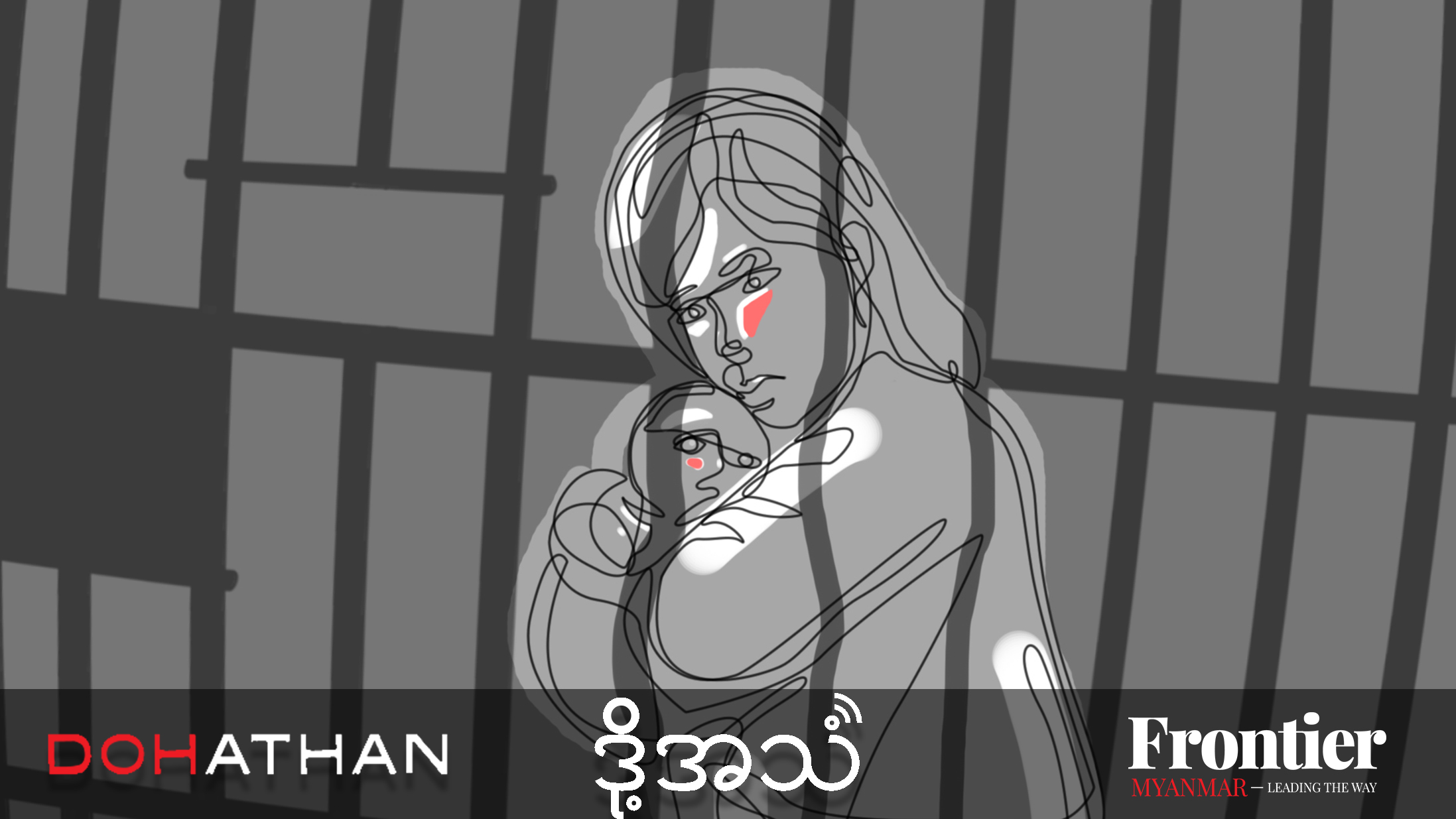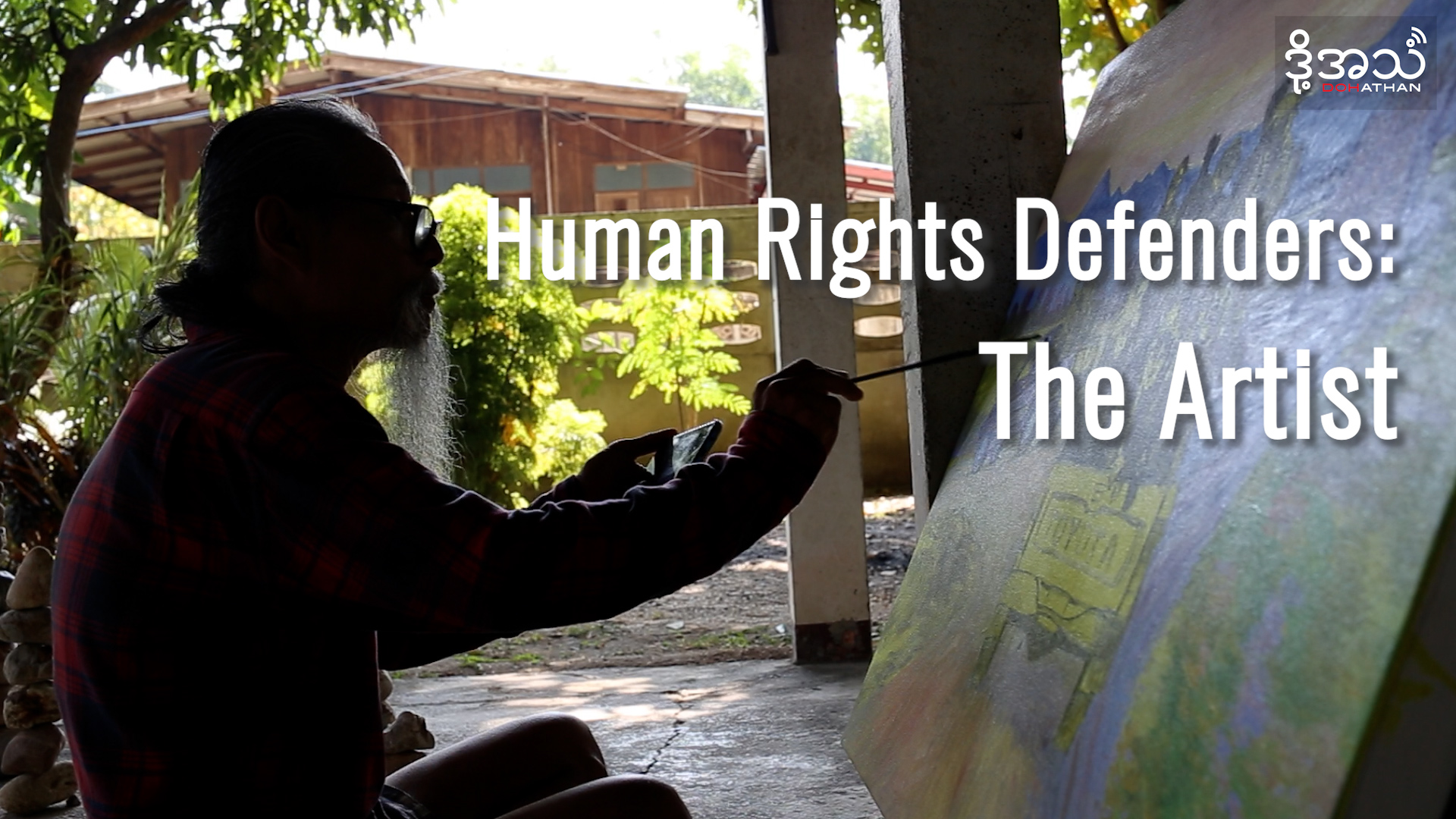Following the killing of the renowned activist while she allegedly tried to escape junta custody, her family and comrades remember a woman who died fighting “the last battle” against military dictatorship.
By HEIN THAR | FRONTIER
Their parents picked beautiful names. The two sisters, Nobel Aye and Nightingale, were named after Alfred Nobel and Florence Nightingale, both pioneers of their fields. But General Ne Win’s regime was not one to reward creativity. When they first enrolled in public schools, they were told to change their unusual names, which sounded Christian and foreign.
So, the elder sister became Hnin May Aung, but across the country she is remembered and mourned as Nobel Aye, one of Myanmar’s bravest activists, who gave her life for the revolution.
Like so many others who have stood up against the military, her life ended brutally. Her brother, Ko Htet Myat, told Frontier that he confirmed with an eyewitness that she was dragged, covered in blood, under a tree in Bago Region’s Waw Township, where she was executed by security forces.
The regime has not officially confirmed her death or returned her body, leaving loved ones in limbo, despite a number of resistance sources saying she’s been killed.
Noble beginnings
Nobel Aye was born on October 11, 1975, a Saturday, the eldest of four siblings. According to traditional Myanmar beliefs, an eldest child born on a Saturday – the day of the dragon – is particularly strong-willed and difficult to control.
She had a revolutionary pedigree. Her father, U Thet Htun Aung, was the son of a relatively prosperous farm owner in the Ayeyarwady delta and joined the Communist insurgency that took root there shortly after independence in 1948.
Her mother, Daw Aye Myint Than, would go on to join the 1988 uprising against military rule, and led the Thingangyun Township chapter of the National League for Democracy after the party was founded the same year.
They married around 1970 and settled in Yangon, where Nobel Aye and Nightingale were born. But Thet Htun Aung left his wife for the monkhood, where he remained until he died in 1985. Aye Myint Than remarried in 1980, giving birth to two more sons. One of them, Htet Myat, born in 1981, recounted this family history from the Thai border with Myanmar, where he works for a human rights organisation.
Aye Myint Than, then a popular tutor, sheltered students fleeing the military’s crackdown on the 1988 protests, before they left Yangon for the mountainous borderlands to join armed groups.
“Since the days of ’88, my mother was loved and respected by student activists as if she was their own mother,” Htet Myat said. “The underground resistance was familiar with our family since we were young.”
Htet Myat added that Nobel Aye quickly became her mother’s closest ally. During the 1990 election, when she was just 15 years old and still in high school, Nobel Aye joined her mother in campaigning for the NLD. But after the pro-democracy party won a landslide victory, the military refused to honour the results. The family supported the creation of the Committee Representing the People’s Parliament, which formed a government-in-exile.
In 1998 mother and daughter were arrested in their home. Aye Myint Than was sentenced to 21 years and sent to Myaungmya Prison in Ayeyarwady Region. Her gravest crime was to copy and distribute NLD leader Daw Aung San Suu Kyi’s seminal book Freedom from Fear. Nobel Aye received an even heftier prison term of 42 years for participating in student protests in 1996, and for being a member of banned organisation the All Burma Federation of Student Unions. As is typical, she was separated from her mother and sent hundreds of kilometres north to Myingyan Prison in Mandalay Region.
Htet Myat said before his sister’s arrest, she sometimes asked him to help hide anti-junta leaflets in the rafters of their home or under Buddha statues – something he barely understood at the time.
Daw Zin Mar Aung, foreign minister for the National Unity Government, a parallel administration appointed by elected lawmakers deposed in the 2021 coup, has spent the last three years shuttling around the world meeting with politicians and diplomats.
But in 1996, she too was an anonymous student hoping for change in Myanmar. She first met Nobel Aye at Yangon’s iconic Shwedagon Pagoda, where a group of underground activists gathered on a Saturday, dressed in white and blue to identify each other.
“Nobel arrived in a hurry; she said was late because she was cooking for her siblings at home,” Zin Mar Aung recalled their first meeting to Frontier. By December of that year, they were the two main leaders of the students’ movement at Dagon University.

Trials and tribulations
But by 1998, the political situation had deteriorated. Aung San Suu Kyi and the NLD had issued an ultimatum, demanding that the junta honour the results of the 1990 election by August 21.
This led to a tense political standoff, and underground activists tried to organise another mass uprising. In an age of limited technology, this meant giving speeches and distributing pamphlets in public places, but Nobel Aye and Zin Mar Aung were quickly identified and captured. They were sent to the Aung Tha Pyae interrogation centre in Yangon’s Mayangone Township. Under the brutal conditions of the centre, they went from being comrades to best friends.
“Each person reacts differently under interrogation,” said Zin Mar Aung. “Some calmly answer what they need to answer. Some are stubborn and keep their mouths shut. The main thing is that you don’t want anybody else to be arrested because of your answers. Nobel Aye was the most strong-willed person I ever met.”
She sat in silence, thinking for a little while, before adding, “Nobel was like fire when she faced the dictator, but she was as cool as water with her friends.”
Zin Mar Aung recalled one day when she heard banging and shouting from the room where Nobel Aye was being questioned, and feared she was being tortured. When Nobel Aye was returned to their shared call three days later, Zin Mar Aung asked if she had been beaten.
“No, my friend, I was beating the table,” Nobel Aye said with a laugh.
She explained that an army major had made a crude joke about the acronym for ABFSU, Ba Ka Tha in Burmese, which sounds similar to the word for a pregnant woman.
“Major, use language that would be appropriate to use with your children,” she reprimanded him after slamming the table. As a punishment, she was ordered to stand up without food or water for three days.
After around two weeks in the interrogation centre, Nobel Aye was transferred to Myingyan Prison, in Myanmar’s searing hot Dry Zone, which became infamous for the abuse meted out to political prisoners. Inmates said they were forced to wear ankle chains at all times, even while doing manual labour like breaking up large rocks, and were regularly beaten or subjected to electric shocks.
“At that time, in 1998, Nobel Aye was the only female political prisoner in the prison,” said another activist who was detained there at the time, talking to Frontier on the condition of anonymity. “We were all struggling to stay alive and proud to be able to survive there. But Ma Nobel, she was always the toughest and most strong-willed among us. Even the strongest men were surprised by her.”
But while she was fierce in the face of adversity, she was supportive and inspiring to those around her. The former prisoner reflected on a comment Nobel Aye made that had stuck with him ever since.
“Our lives belong to us while we’re alive, but our lives belong to history forever.”
While Nobel Aye was battling harsh conditions in prison, her family was struggling to get by in Yangon. Her siblings stopped going to school because they refused to use military government services, and they were toiling to scrape together enough money to send food and provisions to the two prisons every other week.
“Our family was like grass on the ground that had been pressed down by so many feet,” Htet Myat said.
In those hard times, Htet Myat’s father U Tin Maung Aye was a rock for the family. He went around the city selling candles and charcoal to raise money to send food to his wife and step-daughter, while teaching the other children not to feel bitter about their hardship.
“He was a real hero, the hero behind the curtains that nobody could see, a man who faced all of these troubles with only courage and hope,” Htet Myat said.
Meanwhile, a cloud of surveillance and isolation hung over the house.
“The junta-appointed ward leader put a chair in front of our house and always watched and reported on us to military intelligence,” Htet Myat said. “Sometimes when I woke up early in the morning, even if no one was present, that chair was always there.”
The constant monitoring meant other families avoided them like a curse, and Htet Myat said he grew up with few friends. In 2002, he tried to get a job at a computer service shop in downtown Yangon, but was fired after only one day because military intelligence threatened his employer.
The freedom to fight again
In 2005, Nobel Aye and her mother were released in a mass amnesty, but the family’s joy was short-lived. Aye Myint Than soon suffered a stroke, likely linked to her harsh treatment in prison.
But Nobel Aye’s spirit was not broken. In 2007, the military junta ended fuel subsidies, pushing millions of already poor citizens to the brink. Many remember the subsequent protests, dubbed the Saffron Revolution, as a monk-led uprising against military rule. But fewer recall that the seeds were planted by activists like Nobel Aye, who took to the streets to preach messages of resistance.
She was detained again that August, this time sentenced to 11 years in prison. She was still in Monywa Prison in Sagaing Region when the military launched its failed democratic transition. Following an election boycotted by the NLD in 2010, the dictator Senior General Than Shwe handed power to former general U Thein Sein.
Soon after, senior members of the nominally civilian government, including the vice president, publicly insisted there were no political prisoners in Myanmar. This drew a famous rebuke from Nobel Aye in the form of a handwritten note from prison.
“Both imprisonments were due to my analysis, discussions and suggestions about the political situation in Burma. I was and remain imprisoned for these actions. Therefore, I, Hnin May Aung aka Nobel Aye… am a political prisoner,” she wrote.
For this, she was punished with solitary confinement and a ban on visitors. By then, Nobel Aye had been separated from not just her family, but from the love of her life, Ko Tin Aye, another famous student activist.
“He taught me the basics of political activism,” said Ko Min Thwe Thit, former president of the ABFSU, who considers Tin Aye his mentor. This included tips for avoiding arrest, like not wearing red or black shirts, colours associated with the NLD and radical protesters.

“When you sit at a teashop, always face the door,” he added. If you’re waiting for somebody sensitive and they don’t arrive on time, move to another location from where you can observe the intended meeting point.
In 2008, Tin Aye moved to the Thai border town of Mae Sot, where was reunited with Nobel Aye after she was released from prison in 2012. They married the following year and have since become icons of romance and resistance.
“The younger generation talks fondly about their love, and the way the fate of politicians is directly related to the fate of the country,” said Min Thwe Thit. “We always say that both of them put their private lives to the side and gambled their destiny on the country.”
With the country opening up, the pair returned to Myanmar in 2014 as members of the left-wing Democratic Party for a New Society. Zin Mar Aung, who was elected to parliament for the NLD in 2015 and 2020, said Nobel Aye was more radical, a committed socialist.
A glimmer of hope
In February 2021, the military killed hopes of a gradual transition to democracy by seizing power and imprisoning civilian leaders including Aung San Suu Kyi. Many mourned the loss of the new, but limited, freedoms of the preceding decade. But others like Nobel Aye, who had been fighting for more radical change for decades, saw an opportunity in the mass movement sparked by the coup.
“This kind of revolutionary uprising involving the entire public is the kind of thing we political activists always dreamed of,” said Min Thwe Thit.
“I chatted with Ma Nobel a lot [after the coup]. She was very excited about the situation, repeatedly saying this must be the final battle. It’s the last revolution that will end dictatorship in Myanmar, so that the next generation doesn’t have a life like theirs, where their youths are wasted in prison.”
Nobel Aye became an early leader of the General Strike Coordination Body, which helped organise street protests and strikes. She stood with the people on the frontlines in Yangon when, after several weeks of demonstrations, the military began to crack down.
The regime went on to slaughter hundreds of protesters, giving birth to an armed resistance movement. From here, the story becomes murkier as Nobel Aye fled underground. Some friends said she went to Bago Region, but by 2022 had left for Sagaing Region. Others say she even made it to Rakhine State.
But in January this year, pro-military media outlets reported that she and another activist were arrested in eastern Bago’s Waw Township with a car full of guns, bullets and explosives.
The story went that two men in a separate car loaded with weapons were stopped earlier at a regime checkpoint. They confessed that Nobel Aye and Ko Lay Khwin organised the shipment and would soon be passing through the same checkpoint.
In February, news broke that Nobel Aye and the other activist were both shot dead by regime soldiers, allegedly for trying to flee while being transported from the Waw Township Court back to an interrogation centre. Htet Myat called the township court and Bago District police office to confirm the news but said they refused to give him answers. Finally, he managed to track down some locals who told him over the phone that they witnessed the killings in the township’s Kyaik Hla village.
The family has not yet seen Nobel Aye’s body, and the junta still hasn’t released any news about her death or contacted the family. The Waw Township Court and township police department both told Frontier they wouldn’t speak to the media.
The murky circumstances of the arrest and killing have led some to believe she was entrapped; the military knew she was coming and planted weapons in her car. Some also doubt her supposed escape attempt.
Despite the lack of any direct evidence, advocates of these theories point to a pattern of behaviour by the junta.
Ko Thike Tun Oo, a spokesperson for the Political Prisoners Network Myanmar, formed after the coup, said it’s common for the regime to extrajudicially execute political prisoners and then accuse them of trying to escape after the fact. Dozens of political prisoners have gone missing during suspicious transfers.
A former political prisoner himself, Thike Tun Oo said any high-profile prisoner would be escorted by an armed guard while being handcuffed and wearing ankle chains, making escape nearly impossible.
But it does seem Nobel Aye, like many other once-peaceful activists, had embraced the armed struggle before her death.
In July 2022, the military executed Phyo Zeyar Thaw and Ko Jimmy, an NLD parliamentarian and prominent political activist respectively, accused of orchestrating armed resistance in Yangon. Soon after the executions, Min Thwe Thit received a call from Nobel Aye. “She said she’s going to support this war at all costs. She said she will do it even if she has to pay with her life,” he recalled.
Zin Mar Aung told Frontier that as the NUG’s minister of foreign affairs, she will pursue justice through any means available, but as a friend of Nobel Aye’s, she is hurt beyond words.
“Now there won’t be another chance, we’ll never meet again,” she said, adding that there are many other people in Myanmar who can never hope to be reunited with their family members or friends. “I promise to do my duty for all those who suffer this pain.”


